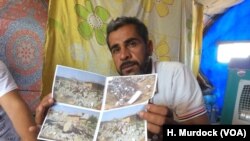The continuing conflict in Iraq has brought destruction to many areas of the country. It also has had an extreme cost for families and children, as well.
The United Nations Children’s Fund, or UNICEF, says fighting has displaced more than 1.5 million children in the last three years.
Their stories are hard to hear.
Zamin Makhool is 28 years old. Last December, she lost two of her children in an airstrike in her neighborhood. An explosive struck her home, leaving it a pile of wreckage. It left a hole three meters deep.
Her four-year-old son and nine-month-old daughter died. Her son died while playing with his “spinning top” toy, she says. Her baby daughter was crushed in the collapsed house.
The attack took place at a time when Islamic State militants controlled the neighborhood.
Since 2014, UNICEF says more than 1,000 children have been killed in Iraq. The organization says Islamic State militants claimed territory -- including Mosul and other cities -- during that period.
Peter Hawkins is a UNICEF representative in Iraq. He said in a statement that, “Across Iraq, children continue to witness sheer horror and unimaginable violence.”
Families risk lives when fleeing militant controlled areas
The fighting continues in Mosul’s Old City, the last place in Mosul where Islamic State still holds power.
Several families recently arrived at a field hospital near the Old City neighborhood to seek treatment.
One mother brought her baby, Saja, who is one year old. She told the doctors that the child had not been fed enough for months. The doctors tried to inject nutrients into her bloodstream with a needle.
“Even the families of militants are trying to flee the Old City now,” said the child’s mother. “It’s too dangerous.”
One day before she came to the hospital, she said, militants had heard that her family was planning to run away. They shot her husband in their house. She then took her children and fled the neighborhood.
UNICEF and fleeing civilians say militants are killing parents and children. They also are preventing families from fleeing and punishing ones that do.
Mortars, airstrikes and so-called improvised explosive devices are harming children and adults. But starvation and disease are greater threats to children.
Poor conditions exist at camps for displaced
Conditions for those displaced by conflict are extremely difficult. Families have gathered in refugee camps in the desert areas surrounding Mosul. Temperatures during the day can reach 40 degrees Celsius in the summer.
Living conditions in the camps in Iraqi-controlled Mosul are poor, with bad food and dirty water. There is also a lack of health care.
Major Mohammad Hassan Abdullah is a medical doctor with the Iraqi Army. He works at a field clinic near the front lines.
“We have 500 to 600 people coming every day, mostly babies and elderly people,” he said. “The problem could nearly be solved with clean water.”
Zamin Makhool has one daughter still living. The family lives in a refugee camp. She says they get their food from non-governmental organizations. But food does not come every day.
Makhool’s husband, Ibrahim, says violence against children will continue as long as Islamic State militants hold territory in Iraq.
Ibrahim says he was trying to sell his car when the family’s two young children were killed in the airstrike. The target of the attack was likely nearby Islamic State bases, or a house next door where militants were living.
“It wasn’t a mistake that airstrikes hit our neighborhood,” Ibrahim Makhool said as he showed a picture of his destroyed home. “There were three IS (Islamic State) bases in the area.”
“They live between families to try to stay safe,” he said. “Then when we are hit, they move on.”
I’m Mario Ritter.
Heather Murdoch reported this story for VOA News. Mario Ritter adapted it for VOA Learning English. Ashley Thompson was the editor.
What do you think can be done for families in Iraq? Write to us in the Comments section, and visit our Facebook page.
________________________________________________________________
Words in This Story
sheer –adj. complete, total
front line --n. an area where soldiers are fighting
elderly –adj. old, aged






